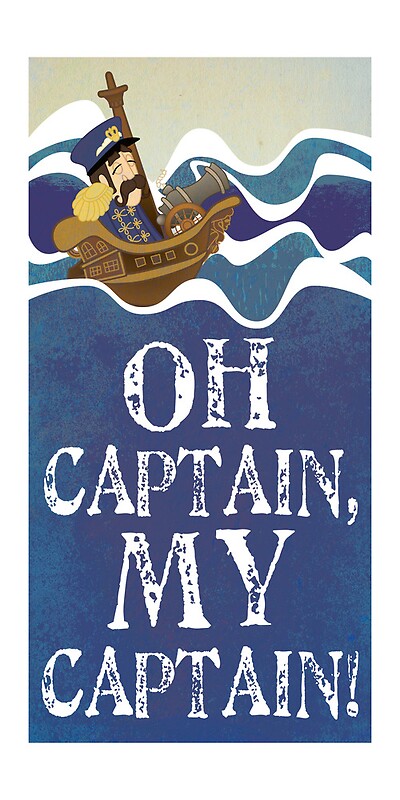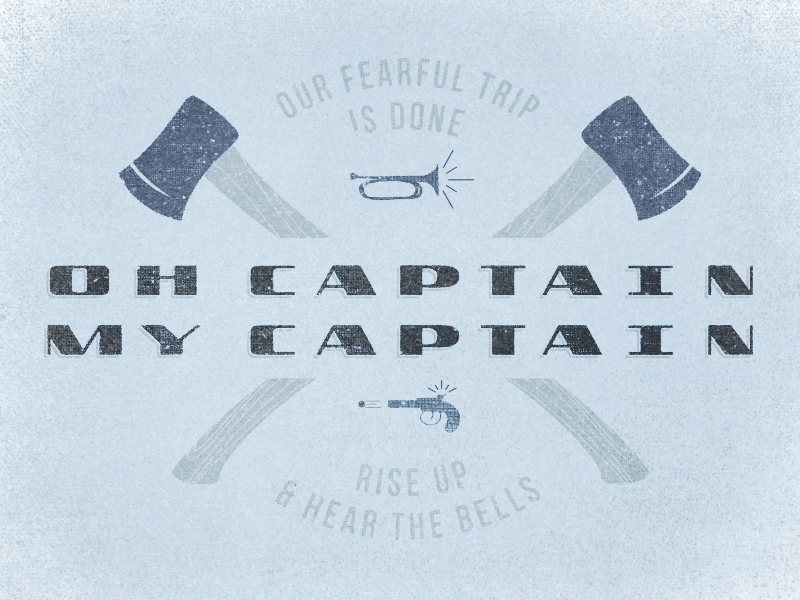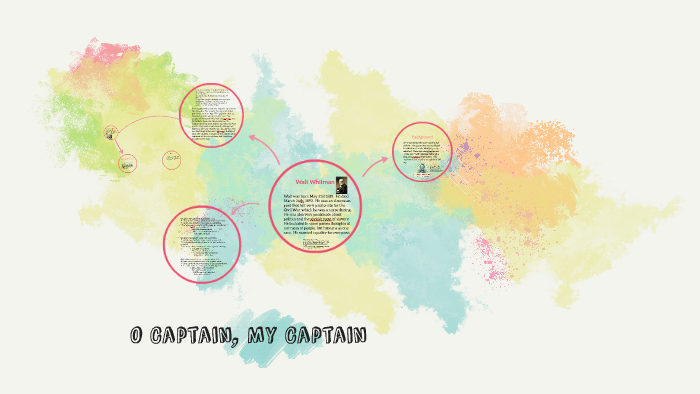

Still, My father does not feel my arm, he has no pulse My Captain does not answer, his lips are pale and Rise up-for you the flag is flung-for you theįor you bouquets and ribbon’d wreaths-for youįor you they call, the swaying mass, their eager O Captain! my Captain! rise up and hear the bells While follow eyes the steady keel, the vessel grim

The port is near, the bells I hear, the people all The ship has weather’d every rack, the prize we Poem Text O Captain! my Captain, our fearful trip is done, He died in Camden, New Jersey, at age 72. Although he lived nearly twenty more years and published four more editions of Leaves of Grass, Whitman produced little significant new work following his stroke. He remained in this position until he suffered a paralytic stroke in 1873.

Following the war Whitman worked for the Department of the Interior and then as a clerk at the Justice Department. During the American Civil War he tended wounded soldiers in army hospitals in Washington, D.C., while working as a copyist in the army paymaster’s office. Over the next few years, Whitman continued to write and briefly returned to journalism. Instead, he focused on his own work, writing and printing the first edition of his collection of poems Leaves of Grass. Whitman did little in terms of employment from the 1850 to 1855. He subsequently edited numerous papers for short periods over the next fourteen years, including the New York Aurora and the Brooklyn Eagle, and published poems and short stories in various periodicals. In addition to teaching, Whitman started his own newspaper, the Long Islander. Unable to find work, he rejoined his family on Long Island in 1836 and taught at several schools. Although his family moved back to Long Island in 1834, Whitman stayed in Brooklyn and then New York City to become a compositor. At age eleven he left school to work as an office boy in a law office and then as a typesetter’s apprentice at a number of print shops. In 1823 the Whitmans moved to Brooklyn, where Whitman attended public school. The second of nine children, Whitman was born in 1819 on Long Island, New York, to Quaker parents. The Captain (Lincoln), the speaker’s father figure and leader, is indeed dead, and what should have been a time of great rejoicing at the end of the Civil War has been turned into a time of national grief and mourning.

However, the last line, in repeating the refrain “Fallen cold and dead,” lends a sense of finality to the poem and leaves no doubt in the reader’s mind. While he knows his Captain is dead, he hopes that he is dreaming, that he is somehow mistaken. The speaker’s difficulty in coming to grips with the death of his Captain is the subject of the poem. The fallen Captain of the poem is an allusion to Abraham Lincoln, and the ship is a metaphor for the ship of state, or more precisely, the United States of America. While engaging fixed patterns of rhyme and meter, the poem manages to communicate Whitman’s heroic vision of Lincoln, the great Union leader of the Civil War, as well as the horror, shock,Īnd dismay Whitman felt at learning of Lincoln’s assassination. Nevertheless, “O Captain! My Captain!” does attest to Whitman’s versatility as a poet. I say that if I’d written a whole volume of My Captains I’d deserve to be spanked and sent to bed with the world’s compliments-which would be generous treatment, considering what a lame duck book such a book would have been!” At the heart of this statement is Whitman’s recognition that the reading audience of his day still preferred conventionally rhymed and metered poems over more experimental free-verse forms that he himself favored. He is noted to have said: “I’m almost sorry I ever wrote that poem. Yet Whitman thought the praise the poem garnered was unwarranted. “O Captain! My Captain!” became an instant classic, and children were taught to recite its verses in school. While “When Lilacs Last in the Dooryard Bloom’d” has become one of Whitman’s most critically acclaimed poems, “O Captain! My Captain!,” which incorporates more conventional rhyme and meter, was by far the most popular of Whitman’s poems during his lifetime. Written on the occasion Abraham Lincoln’s assassination, “O Captain! My Captain!” was first published in the New York Saturday Press (November 1865) and was later included, along with “When Lilacs Last in the Dooryard Bloom’d,” in a group of poems titled “Sequel” to Drum Taps (1865).


 0 kommentar(er)
0 kommentar(er)
